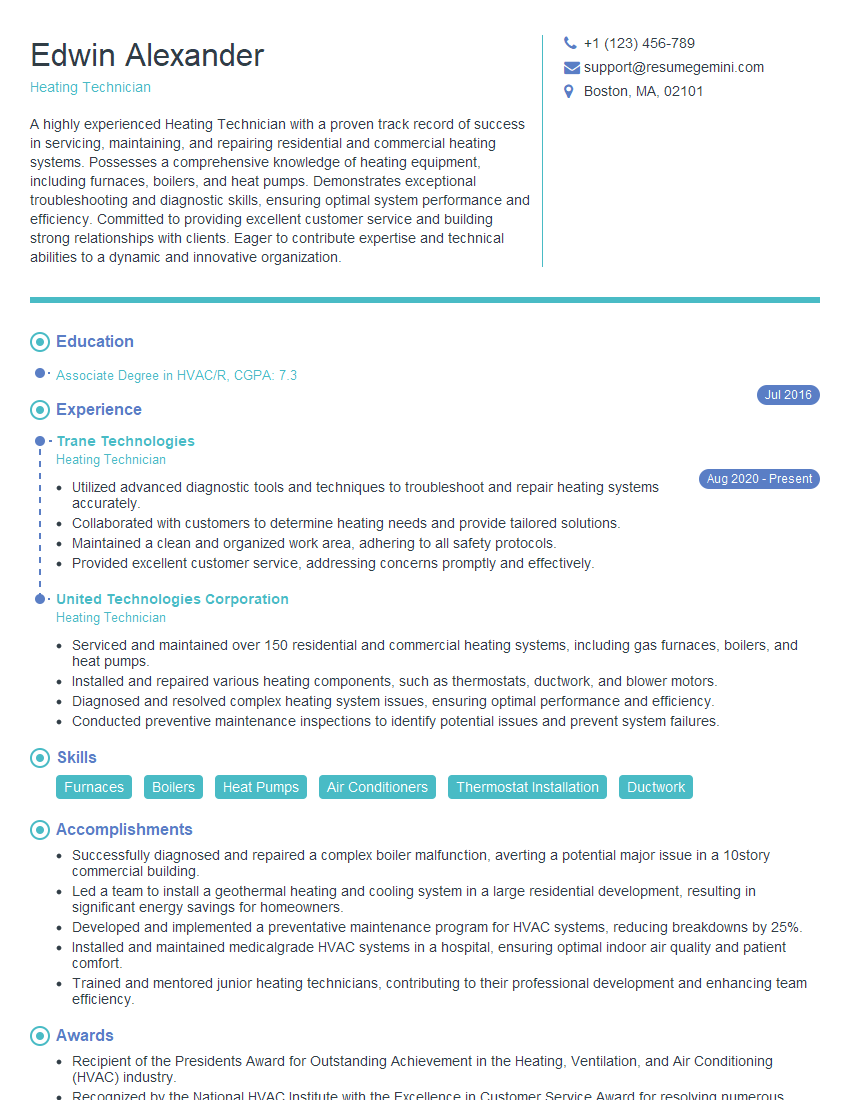Ever felt underprepared for that crucial job interview? Or perhaps you’ve landed the interview but struggled to articulate your skills and experiences effectively? Fear not! We’ve got you covered. In this blog post, we’re diving deep into the Heating Technician interview questions that you’re most likely to encounter. But that’s not all. We’ll also provide expert insights into the key responsibilities of a Heating Technician so you can tailor your answers to impress potential employers.
Acing the interview is crucial, but landing one requires a compelling resume that gets you noticed. Crafting a professional document that highlights your skills and experience is the first step toward interview success. ResumeGemini can help you build a standout resume that gets you called in for that dream job.
Essential Interview Questions For Heating Technician
1. What are the most common types of heating systems?
- Forced-air systems
- Hydronic systems
- Electric heating systems
2. What are the key components of a forced-air heating system?
Furnace
- Heat exchanger
- Burner
- Blower
Distribution system
- Ductwork
- Registers
- Returns
3. How does a hydronic heating system work?
A hydronic heating system circulates hot water through pipes to heat radiators or baseboards located throughout the building. The heated water is generated by a boiler or heat pump.
- Boiler or heat pump
- Pipes
- Radiators or baseboards
4. What are the advantages and disadvantages of electric heating systems?
Advantages:
- Clean and efficient
- Easy to install and maintain
- Quiet operation
Disadvantages:
- More expensive to operate than gas or oil heating systems
- May not be suitable for all climates
5. What are the signs of a faulty heating system?
- Inefficient heating
- Strange noises
- Leaking water or refrigerant
- Frequent breakdowns
6. What are the most common causes of heating system failure?
- Lack of maintenance
- Improper installation
- Old age
- Power outages
- Faulty components
7. What are the steps involved in troubleshooting a heating system?
- Check the thermostat
- Inspect the furnace or boiler
- Check the ductwork or pipes
- Test the electrical system
- Call a qualified technician if the problem cannot be resolved
8. What are the safety precautions that should be taken when working on a heating system?
- Turn off the power to the system
- Wear appropriate safety gear
- Be aware of the location of all gas lines and electrical wires
- Do not attempt to repair a heating system if you are not qualified
9. What are the latest trends in heating technology?
- High-efficiency furnaces and boilers
- Smart thermostats
- Zoning systems
- Geothermal heating systems
10. How can I improve the energy efficiency of my heating system?
- Get a regular tune-up
- Replace old filters
- Seal air leaks
- Install a programmable thermostat
- Consider upgrading to a more efficient heating system
Interviewers often ask about specific skills and experiences. With ResumeGemini‘s customizable templates, you can tailor your resume to showcase the skills most relevant to the position, making a powerful first impression. Also check out Resume Template specially tailored for Heating Technician.
Career Expert Tips:
- Ace those interviews! Prepare effectively by reviewing the Top 50 Most Common Interview Questions on ResumeGemini.
- Navigate your job search with confidence! Explore a wide range of Career Tips on ResumeGemini. Learn about common challenges and recommendations to overcome them.
- Craft the perfect resume! Master the Art of Resume Writing with ResumeGemini’s guide. Showcase your unique qualifications and achievements effectively.
- Great Savings With New Year Deals and Discounts! In 2025, boost your job search and build your dream resume with ResumeGemini’s ATS optimized templates.
Researching the company and tailoring your answers is essential. Once you have a clear understanding of the Heating Technician‘s requirements, you can use ResumeGemini to adjust your resume to perfectly match the job description.
Key Job Responsibilities
Heating technicians ensure the efficient operation and maintenance of heating systems in residential, commercial, and industrial settings. Their key responsibilities include:
1. Installation and Maintenance
Installing, repairing, and maintaining heating equipment, including furnaces, boilers, heat pumps, and radiant heating systems.
2. Troubleshooting and Diagnostics
Identifying and resolving issues with heating systems, using diagnostic tools and techniques to pinpoint problems.
3. Safety and Compliance
Ensuring adherence to safety regulations and building codes, inspecting heating systems for potential hazards and compliance with standards.
4. Customer Service and Communication
Providing excellent customer service, communicating clearly with clients about system operation, maintenance needs, and repairs.
Interview Tips
To ace the interview for a Heating Technician position, follow these tips:
1. Highlight Technical Skills and Experience
Emphasize your expertise in heating system installation, maintenance, and troubleshooting. Provide specific examples of your work experience and highlight any relevant certifications or training.
2. Demonstrate Problem-Solving Abilities
Describe situations where you successfully identified and resolved heating system issues. Showcase your analytical skills and logical thinking process.
3. Emphasize Safety and Compliance Knowledge
Stress your understanding of safety regulations and building codes. Highlight your experience in ensuring the safe operation and maintenance of heating systems.
4. Prepare for Common Interview Questions
Research common interview questions for Heating Technicians, such as “Describe your experience with different types of heating systems” and “What safety measures do you take when working on heating equipment?”
Next Step:
Armed with this knowledge, you’re now well-equipped to tackle the Heating Technician interview with confidence. Remember, preparation is key. So, start crafting your resume, highlighting your relevant skills and experiences. Don’t be afraid to tailor your application to each specific job posting. With the right approach and a bit of practice, you’ll be well on your way to landing your dream job. Build your resume now from scratch or optimize your existing resume with ResumeGemini. Wish you luck in your career journey!
